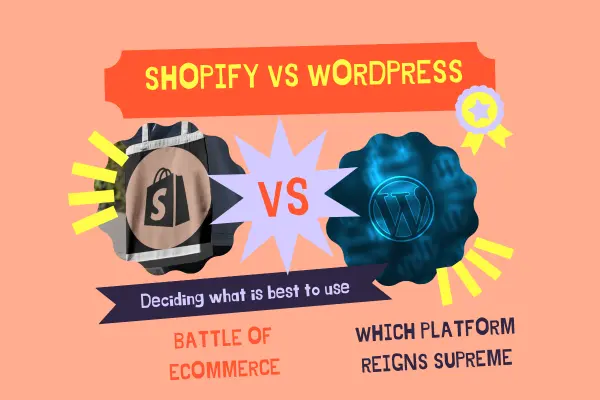Choosing the right platform for your website is crucial for your online success. Shopify Vs WordPress which to use? These are two of the most popular platforms, each offer unique features and benefits. But how do you decide which one to go with for your next website? In this article, we will compare Shopify and WordPress, discussing their ease of use, design options, e-commerce functionality, pricing, SEO, security, support, and scalability. By the end, you’ll have a better understanding of which platform best suits your needs. Obviously it is good to consult with a website designer if you are not an expert as well.
What is Shopify Exactly?
Shopify is a powerful e-commerce platform that allows you to build and manage your online store with ease. It’s designed specifically for businesses looking to sell products online and has a wide range of features to help you succeed.
Features of Shopify
- User-friendly interface
- Numerous professionally designed templates
- Built-in e-commerce features
- Subscription-based pricing
- Robust security measures
Pros and Cons of Shopify
Pros:
- Easy to set up and manage
- Secure and reliable
- Seamless integration with various payment gateways
- Dedicated support and community
Cons:
- Limited customization
- Monthly fees can add up
- Transaction fees for third-party payment gateways
What is WordPress?
WordPress is an open-source content management system (CMS) that powers millions of websites worldwide. It’s highly customizable and versatile, making it an excellent choice for a wide range of website types.
Features of WordPress
- Extensive customization options
- Thousands of themes and plugins
- E-commerce functionality through plugins
- Flexible pricing options
- Large user community and extensive documentation
Pros and Cons of WordPress
Pros:
- Highly customizable and flexible
- Free to use, with optional paid features
- Large community and extensive resources
- SEO-friendly and excellent for content-heavy websites
Cons:
- Can have a steeper learning curve for beginners.
- 2. Requires manual updates and maintenance
- Potential security vulnerabilities if not properly managed
Shopify vs. WordPress: Ease of Use
Shopify: User-friendly interface
Shopify is known for its intuitive interface, making it easy for beginners to set up and manage their online store. With a simple drag-and-drop editor, even those with limited technical knowledge can quickly create a professional-looking website.
WordPress: Customizability and flexibility
While WordPress offers endless customization options, it can be overwhelming for those new to website building. However, with a plethora of resources and tutorials available online, mastering the platform becomes easier over time.
Shopify vs WordPress: Design and Themes
Shopify: Predesigned templates
Shopify offers a selection of professionally designed templates that cater to various industries. Although the customization options are more limited compared to WordPress, the templates are optimized for e-commerce and mobile responsiveness.
WordPress: Thousands of themes
WordPress boasts a vast library of both free and premium themes, allowing you to create a unique website tailored to your brand. With the help of plugins, you can further customize your site to meet your specific needs.
Shopify vs WordPress: E-commerce Functionality
Shopify: Built for e-commerce
As a dedicated e-commerce platform, Shopify comes with built-in features like inventory management, payment processing, and shipping options. It also integrates with popular marketplaces such as Amazon and eBay.
WordPress: E-commerce through plugins
To add e-commerce functionality to a WordPress site, you’ll need to use plugins like WooCommerce or Easy Digital Downloads. While these plugins are powerful and customizable, they may require additional setup and maintenance compared to Shopify’s built-in features.
Shopify vs WordPress: Pricing
Shopify: Subscription-based pricing
Shopify operates on a subscription model, with monthly fees ranging from $29 to $299, depending on the plan you choose. Additional costs include transaction fees for third-party payment gateways and paid apps or themes.
WordPress: Flexible pricing options
WordPress itself is free to use, but you’ll need to cover the costs of hosting, domain registration, and premium themes or plugins. This allows for more flexibility in pricing, depending on your needs and budget.
Shopify vs WordPress: SEO
Shopify: SEO-friendly features
Shopify includes basic SEO features like customizable meta tags and URLs, and automatically generates sitemaps. However, advanced SEO options are limited compared to WordPress.
WordPress: SEO plugins and customization
With WordPress, you have access to powerful SEO plugins like Yoast SEO and All-in-One SEO Pack, which offer advanced tools for optimizing your website’s content and structure. The platform’s flexibility also allows for more in-depth SEO customization.
Shopify vs WordPress: Security
Shopify: Robust security measures
As a hosted platform, Shopify handles security measures such as SSL certificates and PCI compliance. This ensures that your customers’ data is protected and your online store remains secure.
WordPress: Security plugins and updates
With WordPress, security is largely in your hands. You’ll need to regularly update your themes, plugins, and core software, as well as use security plugins like Wordfence or Sucuri to protect your site from potential threats.
Shopify vs WordPress: Support and Community
Shopify: Dedicated support and community
Shopify offers 24/7 customer support via phone, email, and live chat. Additionally, there’s a comprehensive help center and an active community forum where you can find answers to common questions.
WordPress: Large user community and extensive documentation
While WordPress does not provide direct support, its extensive documentation and massive user community offer numerous resources to help you troubleshoot and resolve issues.
Wrapping up
In summary, both Shopify and WordPress have their unique advantages and drawbacks. Shopify is an excellent choice for those looking for a user-friendly, all-in-one e-commerce platform with built-in features and dedicated support. On the other hand, WordPress offers unparalleled customization options, making it ideal for content-heavy websites and businesses requiring a more flexible solution. Ultimately, the choice between Shopify and WordPress depends on your specific needs, budget, and technical expertise.

